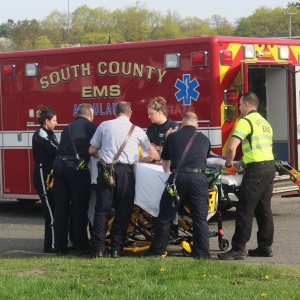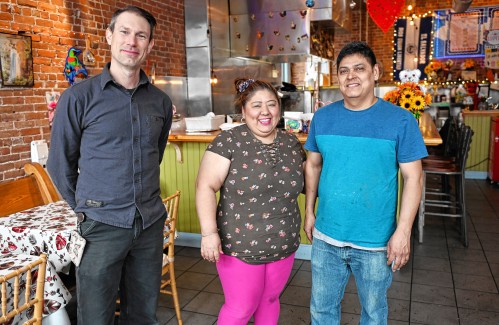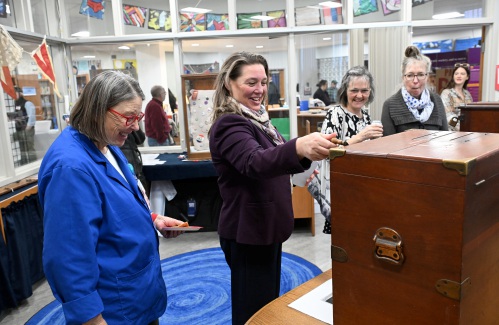
Latest News
 My Turn: This is not who we are
My Turn: This is not who we are
 No contested races on ballot in New Salem election
No contested races on ballot in New Salem election

Garage, house sustain ‘major damage’ in Phillips Street blaze in Greenfield
GREENFIELD — No injuries were reported Thursday evening after a fire that started in a garage spread to the house next to it on Phillips Street.

$200K grant fuels expansion at Radial Dynamics in Greenfield
GREENFIELD — Radial Dynamics, a Greenfield hydraulic engineering company, will steer its way into the future with its new high-tech manufacturing equipment, including a robotic arm that was purchased with the help of a $200,000 grant.
Most Read
 Northfield man dies in Erving motorcycle crash; Bernardston man injured in Deerfield crash
Northfield man dies in Erving motorcycle crash; Bernardston man injured in Deerfield crash
 Garage, house sustain ‘major damage’ in Phillips Street blaze in Greenfield
Garage, house sustain ‘major damage’ in Phillips Street blaze in Greenfield
 Extension cord under hay ‘being considered a potential factor’ in Leverett house fire
Extension cord under hay ‘being considered a potential factor’ in Leverett house fire
 Lesbian bar opens in Greenfield: Last Ditch is the new space for the Valley’s queer community
Lesbian bar opens in Greenfield: Last Ditch is the new space for the Valley’s queer community
 Real Estate Transactions: May 2, 2025
Real Estate Transactions: May 2, 2025
 New Salem town coordinator stepping down
New Salem town coordinator stepping down
Editors Picks
 Business Briefs: May 2, 2025
Business Briefs: May 2, 2025
 Fun Fest to showcase day of music in Turners Falls on May 10
Fun Fest to showcase day of music in Turners Falls on May 10
 Conway Historical Society to explore ‘forgotten Founding Father’ Joseph Hawley
Conway Historical Society to explore ‘forgotten Founding Father’ Joseph Hawley
 Montague, Gill and Erving Notebook: May 2, 2025
Montague, Gill and Erving Notebook: May 2, 2025
Sports

HS Roundup: Olivia Machon drives in winning run in extras to propel Frontier softball past Greenfield, 6-5
It was an extra-inning thriller in South Deerfield on Thursday between the Frontier and Greenfield softball teams.
 Bulletin Board: FCL Softball registrations underway
Bulletin Board: FCL Softball registrations underway
Opinion

Ed Gregory: Industry away
I do believe emperor Donald Trump failed to factor in a couple of significant dynamics into his delusion of having sizeable industry return to the good ‘ole U.S. of A. I give you robotics and unions. Heavy manufacturing in our technical world incorporates industrial robots to do jobs that a great deal of humans once performed, and, new jobs are being roboticized daily. For those areas that may require people, unions will most likely be a component in the workplace.
 Christine Heard: Love the semicolon
Christine Heard: Love the semicolon
 Holly Lankowski: Wolfram has a plan
Holly Lankowski: Wolfram has a plan
 Kim Wolfram: Wolfram brings a legacy of service to Deerfield
Kim Wolfram: Wolfram brings a legacy of service to Deerfield
 Ava Gips: Examining Wolfram record
Ava Gips: Examining Wolfram record

Your Daily Puzzles

An approachable redesign to a classic. Explore our "hints."

A quick daily flip. Finally, someone cracked the code on digital jigsaw puzzles.

Chess but with chaos: Every day is a unique, wacky board.

Word search but as a strategy game. Clearing the board feels really good.

Align the letters in just the right way to spell a word. And then more words.
Business

As Shady Glen Diner awaits buyer, current owner extends hours, shores up staffing
TURNERS FALLS — Last June, the Shady Glen Diner at 7 Avenue A was put up for sale. Nine months later, a buyer still has not been found, but owner Charles Garbiel has extended the diner’s hours and expects to play the long game.
 Expanding child care options: Hilltown Children’s Center opens in Shelburne
Expanding child care options: Hilltown Children’s Center opens in Shelburne
 Cooking up an expansion: Cocina Lupita eyes second location in Turners Falls
Cooking up an expansion: Cocina Lupita eyes second location in Turners Falls
 Incandescent Brewing now open in Bernardston
Incandescent Brewing now open in Bernardston
Arts & Life

Northfield’s Trinitarian Congregational Church marks 200th year, looks to continue its ‘living legacy’
As Northfield’s Trinitarian Congregational Church celebrates its 200th anniversary this year, longtime and returning members were given the chance to reflect on the institution’s beginnings and how it has changed with time.
Obituaries
 Salvatore Francis Arnone
Salvatore Francis Arnone
Bernardston, MA - Salvatore "Sal/Santa" Francis Arnone, 85, of Bernardston, passed away surrounded by his loving family Tuesday, 04/29/2025 after a tough battle with cancer. He was born in Enfield, CT on January 3, 1940, the son of the ... remainder of obit for Salvatore Francis Arnone
 Michael R. Hyytinen
Michael R. Hyytinen
Lt. Michael R. Hyytinen Pima, AZ - On March 22, 2025, Lt. Michael R. Hyytinen, United States Navy, Retired, decided today was the day to walk the wind. Michael was born in Fitchburg, Massachusetts on December 3, 1942, to his parents Rei... remainder of obit for Michael R. Hyytinen
 Michael George Shea
Michael George Shea
Michael "Mike" George Shea Shelburne Falls, MA - Michael "Mike" George Shea, 73, of Shelburne Falls, MA, passed away peacefully surrounded by family on Monday, April 28, 2025 at Baystate Franklin Medical Center in Greenfield, MA. He was ... remainder of obit for Michael George Shea
 Elizabeth C. Fay
Elizabeth C. Fay
Greenfield, MA - Elizabeth C. Fay, 92, a lifelong resident of Greenfield, died Monday, April 28th at Charlene Manor Extended Care Facility. She was born in South Deerfield, MA on August 5, 1932, the daughter of Stanley and Anne (Discawi... remainder of obit for Elizabeth C. Fay

 Winner named in 34th annual Poet’s Seat Poetry Contest in Greenfield
Winner named in 34th annual Poet’s Seat Poetry Contest in Greenfield
 Orange faces $1.7M deficit as officials seek to balance municipal, education needs in FY26
Orange faces $1.7M deficit as officials seek to balance municipal, education needs in FY26
 Greenfield Ways and Means Committee OKs $67.93M budget proposal, sending it to City Council
Greenfield Ways and Means Committee OKs $67.93M budget proposal, sending it to City Council
 In celebration of Law Day, Franklin County students tour Justice Center
In celebration of Law Day, Franklin County students tour Justice Center
 Annual bowling fundraiser supports Big Brothers Big Sisters
Annual bowling fundraiser supports Big Brothers Big Sisters
 Effort to plant 700 trees, shrubs at Colrain Street lot in Greenfield starts Saturday
Effort to plant 700 trees, shrubs at Colrain Street lot in Greenfield starts Saturday
 Small CPA projects, outstanding bills swiftly approved at Whately Special Town Meeting
Small CPA projects, outstanding bills swiftly approved at Whately Special Town Meeting
 UMass football notebook: Jakobie Keeney-James signs with Detroit Lions as undrafted free agent
UMass football notebook: Jakobie Keeney-James signs with Detroit Lions as undrafted free agent  U.S. Open Local Qualifier takes place at Crumpin-Fox Club Thursday (PHOTOS)
U.S. Open Local Qualifier takes place at Crumpin-Fox Club Thursday (PHOTOS) HS Roundup: Pioneer baseball moves to 11-0 following 6-4 win over Frontier (PHOTOS)
HS Roundup: Pioneer baseball moves to 11-0 following 6-4 win over Frontier (PHOTOS) Northfield’s Wild Geese Decluttering helps clients achieve comfort through organization
Northfield’s Wild Geese Decluttering helps clients achieve comfort through organization Speaking of Nature: Climbing out on a limb: The Hartford fern is not your typical fern
Speaking of Nature: Climbing out on a limb: The Hartford fern is not your typical fern Lesbian bar opens in Greenfield: Last Ditch is the new space for the Valley’s queer community
Lesbian bar opens in Greenfield: Last Ditch is the new space for the Valley’s queer community Living and breathing democracy: Smithsonian museum sets up traveling exhibit inside the Mohawk Trail Regional School library
Living and breathing democracy: Smithsonian museum sets up traveling exhibit inside the Mohawk Trail Regional School library The bomb that never dropped: New book details how Massachusetts planned during the Cold War
The bomb that never dropped: New book details how Massachusetts planned during the Cold War
